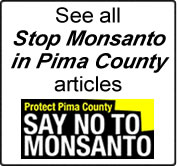Move Another Step Toward Improved Health By Taking the No GMO Challenge
Ready to take another step in eating for optimal health? Take the No GMO Challenge.
Five days ago, on April 22, Earth Day, co-sponsors Real Food Media and the Institute for Responsible Technology started a campaign urging consumers to take the No GMO Challenge to protect themselves from one of history’s greatest man-made health and environmental threats – genetically modified organisms (GMOs). It is a rolling challenge, meaning you can join at anytime. Begin by cleaning out your cupboard and make a 30-day commitment to eating as many non-GMO meals as possible. This challenge is particularly important for people who have switched to eating more corn after starting a gluten-free diet.
Organizers of the No GMO Challenge hope U.S. shoppers will flex their considerable spending power during the No GMO Challenge to buy only non-GMO products. People who have already signed up for the No GMO Challenge include moms, farmers, chefs, scientists, physicists, biologists, home cooks, retailers and nutritionists like me.
Consumer polls show that 9 out of 10 Americans want GM foods labeled so they can avoid buying them. Nearly two-thirds of products on supermarket shelves contain unlabelled genetically modified ingredients. A controversial Food and Drug Administration exception made in the 1990s, permits GMOs to enter the food supply without adequate safety testing, say watchdog groups.
To help get the word out about GM foods, organizers of the No GMO Challenge ask people to pledge that for 30 days, they will avoid GMO food made from the 5 main GM crops: corn, soy, canola and cottonseed oil, and sugar from sugar beets.
Ann Marie Michaels, the founder the Real Food Media Blog Network says, “We are asking consumers to try to avoid these foods and to talk about it, blog about it, tweet about it, post about it on Facebook, and get the word out as much as possible. At the No GMO Challenge site, we’ll have videos and news articles you can link to or blog about or tweet, and you can also just write about your experiences going GM-free.”
The rolling No GMO Challenge, similar to the Eat Local Challenge, launched on Earth Day and will continue until GMOs are driven out the food supply, organizers say. Consumers are asked to organize, educate and build awareness about the dangers of GMOs until that goal is realized.
Jeffrey Smith, a leading expert on the health dangers of GMOs, says that Earth Day is the right time to draw attention to the environmental threat posed by GMOs. “GM crops concentrate corporate control of food, increase herbicide use without increasing average yields, endanger food security, are detrimental to sustainable and organic farming, and trap farmers in a cycle of debt and dependence. They shrink biodiversity, harm beneficial insects, damage soil bacteria, contaminate non-GM varieties, and persist in the environment. The presence of self-propagating genetic pollution might outlast the effects of global warming and nuclear waste,” he says.
Scientists warn that GM foods may set off allergies, increase cancer risks, damage food quality and produce lasting toxins in the environment. GMOs also increase the risk of antibiotic resistant strains of bacteria, due the use of antibiotic resistant genes in GM food.
Non-GMO Trend Accelerating
Worldwide concerns about GMOs have been accelerating. Recent government-funded studies in Austria and Italy linked GMOs to infertility, immune responses, and poorer health of newborns. Other research links increased cancer risk to milk treated with genetically engineered bovine growth hormone has already forced most of the nation’s top dairies, plus Wal-Mart, Starbucks, Yoplait, and Dannon, to commit to stop using it in some or all their products.
Last week, Germany became the sixth European Union nation to ban the planting of Europe’s only approved GM seed—a corn variety by US biotech giant Monsanto, which is engineered to produce its own toxic pesticide. German Agriculture Minister Ilse Aigner concluded that it ”represents a danger for the environment.”
Michaels, who is a rising star in the food blogosphere says, “The majority of Americans don’t trust GM foods and want them labeled. The sad thing is there’s so little information about it. Most of us are eating GMOs every day and we don’t even know it.”
No GMO Challenge co-sponsor, the Institute for Responsible Technology (IRT), wants to remedy that by providing free Non-GMO Shopping Guides for participants. Full of informative charts, tips, and non-GMO brand selections, the Guide makes buying non-GMO easy. IRT’s executive director Jeffrey Smith says, “We expect the No GMO Challenge to magnify the current trend away from high-risk GM foods.”
Learn more at the No GMO Challenge Website.
Sign yourself up for the challenge at the Join the challenge page.
Melissa’s Comments:
I encourage you to take the No GMO Challenge, especially if you eat gluten free but have been eating corn or soy in place of wheat products. It’s a win-win for you. There is no health drawback to avoiding corn, soy, canola, cottonseed, and sugar – only benefits. These five ingredients are highly processed, newfangled foods that we know promote disease. Most of them are common allergens and most wreak havoc with blood sugar and insulin levels. By avoiding them, you not only will protect yourself from the many health dangers of GMOs but you will also protect yourself from foods that lead to disease in many other ways, too. If you haven’t been avoiding GMOs up to now, take the challenge and take another step toward improved health. You’ll likely feel or see some improvements within a week or two, and if you eat more fresh produce in place of those foods, you should lose unwanted weight, too.
Copyright © 2009 Melissa Diane Smith
